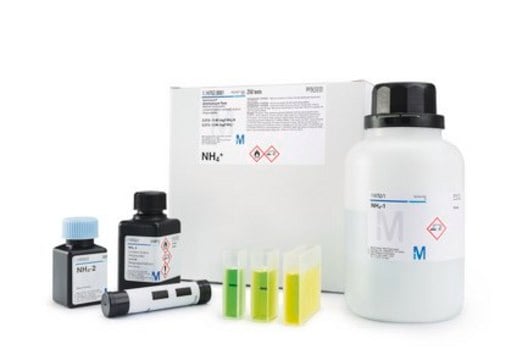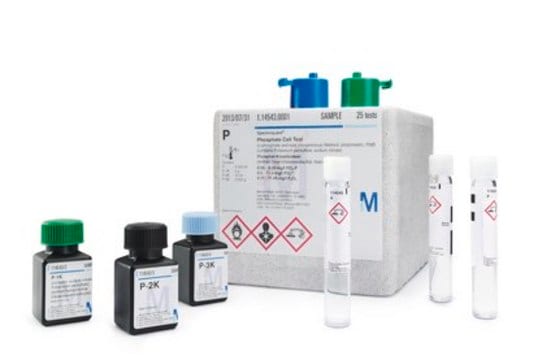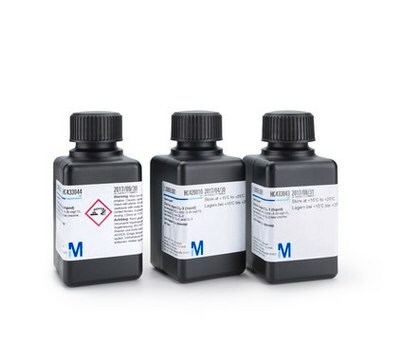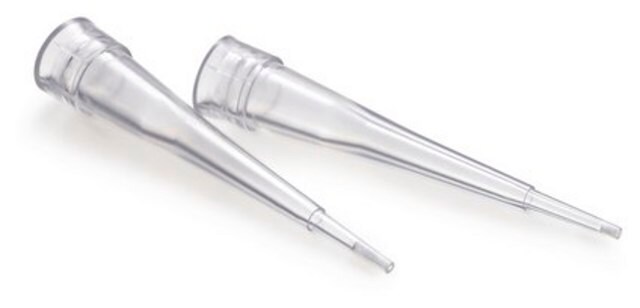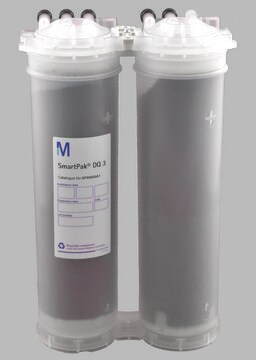1.00595
Chlorine Test, photometric
photometric, 0.030-6.00 mg/L (Cl2), Spectroquant®
About This Item
Productos recomendados
product name
Chlorine Cell Test, photometric, 0.030-6.00 mg/L (Cl2), Spectroquant®
product line
Spectroquant®
Quality Level
usage
sufficient for 200 tests (free chlorine)
specific analyte(s)
chlorine
measuring range
0.030-6.00 mg/L (Cl2)
technique(s)
photometry: suitable
compatibility
for use with Spectroquant® Move 100
for use with Spectroquant® Nova 60 A
for use with Spectroquant® Prove 100
for use with Spectroquant® Prove 300
for use with Spectroquant® Prove 600
detection method
photometric (DPD)
storage temp.
15-25°C
General description
This Spectroquant® Chlorine test allows the accurate quantification of chlorine in various waters. Chlorinated disinfectants are still in common use all over the world, their major applications being in the chlorination of drinking water and swimming pools. In weakly acidic solution free chlorine reacts with dipropyl-p-phenylenediamine (DPD) to form a red-violet dye that is determined photometrically.
The method is analogous to EPA 330.5, APHA 4500-Cl2 G, and DIN EN ISO 7393-2.
All our Cell and Reagent Test Kits are equipped with the unique Live ID (2D barcode) which allows seamless method recognition and contains essential information such as lot number, expiry date, and automatic calibration updates.
The Spectroquant® Cell Tests come with prefilled 16 mm round cells as well as all the required reagents to perform the analysis according to the procedure described in the accompanying instruction leaflet.
Application
- Sustainable lindane waste remediation: Surfactant-driven residual DNAPL extraction and oxidation in a real landfill (LIFE SURFING).: This study uses a chlorine cell test to assess the effectiveness of surfactant-driven extraction and oxidation processes for the remediation of lindane waste in a landfill, highlighting innovative environmental cleanup methods (Fernández et al., 2024).
- Disinfectant-induced ammonia oxidation disruption in microbial N-cycling process in aquatic ecosystem after the COVID-19 outbreak.: Utilizes chlorine cell tests to study the impact of disinfectants on microbial nitrogen cycling in aquatic systems, providing critical insights into environmental effects of increased disinfectant use during the pandemic (Yang et al., 2024).
Legal Information
signalword
Danger
hcodes
Hazard Classifications
Eye Irrit. 2 - Repr. 1B
Storage Class
6.1D - Non-combustible, acute toxic Cat.3 / toxic hazardous materials or hazardous materials causing chronic effects
wgk_germany
WGK 2
flash_point_f
Not applicable
flash_point_c
Not applicable
Certificados de análisis (COA)
Busque Certificados de análisis (COA) introduciendo el número de lote del producto. Los números de lote se encuentran en la etiqueta del producto después de las palabras «Lot» o «Batch»
¿Ya tiene este producto?
Encuentre la documentación para los productos que ha comprado recientemente en la Biblioteca de documentos.
Protocolos
AQA Standard for free chlorine - Preparation of a standard solution for free chlorine
AQA Standard for free chlorine - Preparation of a standard solution for free chlorine - Preparation of a stock solution of free chlorine: First prepare a 1:10 dilution using a sodium hypochlorite solution containing approximately 6 - 14 % of active chlorine. For this pipette 10 ml of sodium hypochlorite solution into a calibrated or conformity-checked 100-ml volumetric flask and then make up to the mark with water for analysis.
Preparation of a standard solution for free Chlorine according to DIN EN ISO 7393
Nuestro equipo de científicos tiene experiencia en todas las áreas de investigación: Ciencias de la vida, Ciencia de los materiales, Síntesis química, Cromatografía, Analítica y muchas otras.
Póngase en contacto con el Servicio técnico